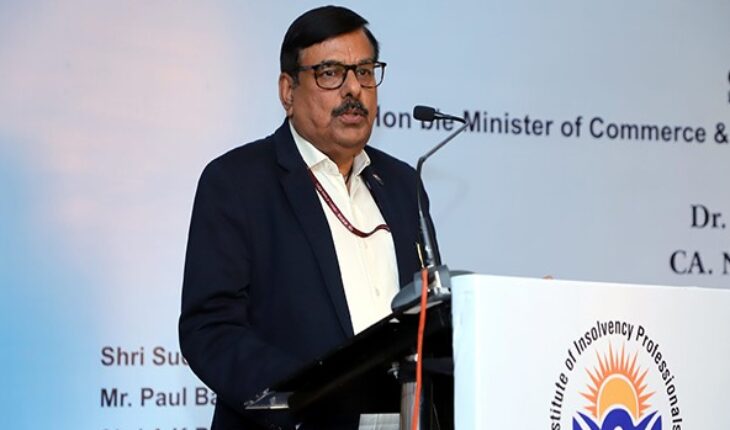New Delhi : In the realm of Sustainable Practices, “More than 42,000 cases have been brought for resolution under IBC (Insolvency and Bankruptcy Code), resulting in the realisation of significant value. The positive outcomes have led to a behavioural change in the business landscape, encouraging companies to prioritise financial stability and sustainable practices”, stated Sudhaker Shukla, Whole Time Member, Research and Regulation Wing, Insolvency and Bankruptcy Board of India (IBBI) at the International Conference on “Charting a Sustainable Path: Addressing Corporate Stress organised by the Associated Chambers of Commerce and Industry of India (ASSOCHAM) in New Delhi.
Shukla revealed that there are several positives since the IBC code was introduced in 2016. The Code has levied a time-bound framework for resolution of creditor situations in India. “Over 26,000 cases have been settled before admission, releasing nine lakh crores of value, demonstrating the positive impact of IBC-induced behavioural change,” he said.
Shukla emphasised the crucial role of resolvability in ensuring the longevity of companies in today’s competitive market. He stated, “Competition and innovation are the driving forces behind any successful company. Companies must follow competitive paths and embrace innovations to thrive. Resolvability is a goal to cherish; it ensures that companies remain sustainable and adaptable.”
Highlighting the importance of timely action, Shukla mentioned, “Timely resolution is essential. Companies resolved within the timeline specified in the code fetched a realisable value of 41%, compared to a significant drop to 21% for those resolved after a prolonged period. Time is of the essence.”
Shukla also commended the efforts of ASSOCHAM and the Association of Certified Chartered Accountants (ACCA) in promoting sustainability through robust accounting standards. He stressed the need for companies to maintain resolvability and have a ‘living will’ in place, enabling them to explore alternative solutions during stressful periods.
He concluded by highlighting the IBBI’s commitment to continuous improvement, stating, “We have undertaken 90 regulatory interventions in less than seven years, showcasing our agility and responsiveness to market needs. The evolving regulatory framework ensures the IBBI remains at the forefront of facilitating sustainable corporate practices.”
Dr. Praveen Kumar Tiwari, a Full-Time Member of the National Financial Reporting Authority (NFRA) in India said ,”The statutory recognition of accounting standards in 1999 and the establishment of NFRA in 2018-mark crucial milestones.” Regarding NFRA’s functions, he said, “Our role involves setting high-quality standards and exercising effective oversight over accounting and auditing matters. This is aimed at protecting public interest, investors, creditors, and prescribed classes of companies.”
He clarified, “NFRA does not set separate accounting and auditing standards but recommends and reviews proposals for new Indian accounting standards or amendments. These are prescribed by the central government after consultation.” He further elaborated, “NFRA has reviewed and recommended numerous proposals related to Indian accounting standards, including the effective accounting of lease obligations, fair value measurement for investment properties, and classification of liabilities.”
Anita Shah Akella, Joint Secretary, Ministry of Corporate Affairs, Govt. of India, informed, “Over the past few years, there has been tremendous improvements in the accounting and auditing sector and the stakeholders have faced some well-documented challenges. A series of high-profile failures led to wide-ranging and systemic reforms, including the separation of accounting firms’ audit and consulting businesses, the introduction of new regulators, and the prospect of joint audits. Accounting firms are beginning to adapt to the new environment, but the sector is still enduring a period of transition. Instances of unacceptable audit behaviour that surprises us from time to time.”
She also emphasised the critical importance of addressing accounting, auditing, and ESG compliance in the context of corporate stress. “ESG performance can influence the value of distressed assets during insolvency or bankruptcy proceedings,” she noted. “Potential buyers, investors, or creditors increasingly take into account a company’s environmental and social impact when assessing its value and potential for recovery.” The Joint Secretary, the Ministry of Corporate Affairs urged Indian Corporates to consider sustainability beyond the present, emphasising the need to prepare for future perspectives.
Helen Brand OBE Chief Executive, ACCA, UK discussed about the economic fairness with the right business ethics with the right values and opportunities for people. It is a matter of stakeholder concern to run a business in a sustainable manner with proper security and addressing corporate stress. Various business risks can be daunting and a new way of doing business should be explored. Social and governance factors are likely to find higher significance as companies strive to contribute to a more sustainable and equitable future.
ESG objectives redefine success in terms of both financial and social dimensions, according to Preeti Malhotra, Chairman of the Smart Bharat Group and Chairperson of the ASSOCHAM National Council for Corporate Affairs, Company Law, and Corporate Governance. It offers a fresh viewpoint for reviving an organization’s journey toward sustainability. It gives the supply chain a decent level of certainty and plots the future’s potential influence on investment choices. Long-term benefits of ESG for the business include increased corporate relief, which is largely ensured by good governance.
The Associated Chambers of Commerce and Industry of India (ASSOCHAM), New Delhi, India and Association of Chartered Certified Accountants (ACCA), joined hands in MoU and agreed to promote the mutual co-operation for the advancement of their respective members and growth of businesses. The purpose of this MOU is to set out the understanding between the parties in the spirit of cooperation.






